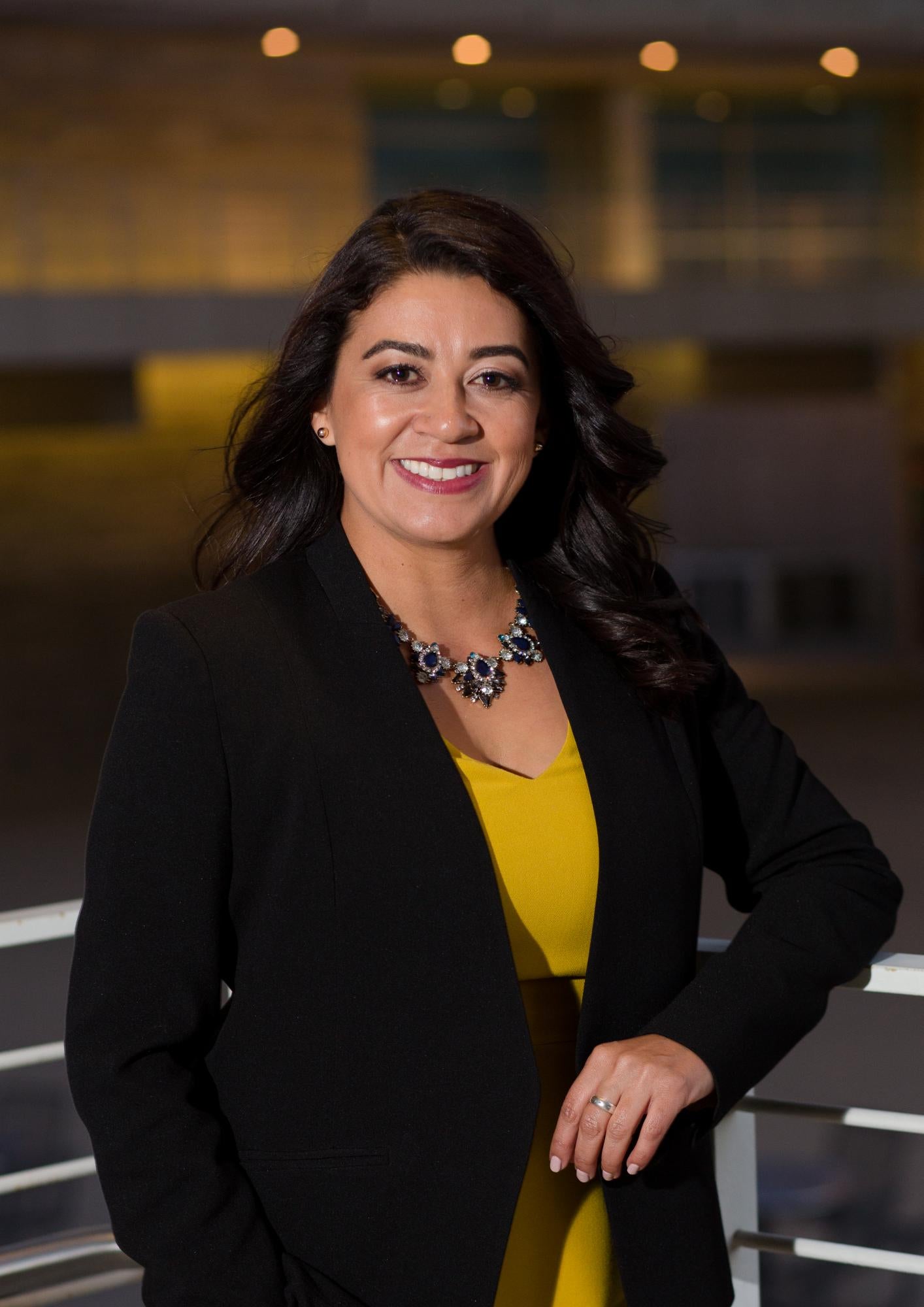2021 - 2022 Academic Year
DISCO DANCE PARTY at CLUB 156 with Legendary DJ Luis Mario Orellana Rizzo
22 April 2022
5PM DJ Luis Mario and Dr. Kristie Soares, in Conversation
6PM Dance Party
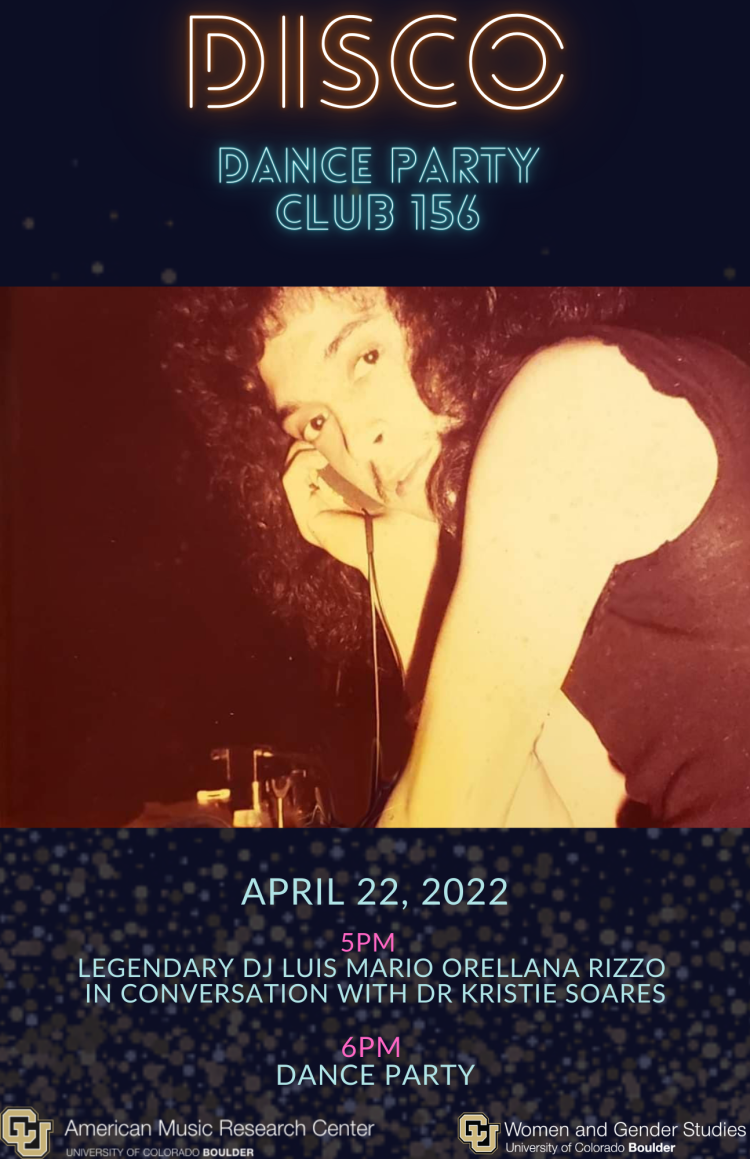
Asian American Identities in Music Video
A public lecture by Dr. Eric Hung (Music of Asian America Research Center)
13 April 2022
IMIG S101
To learn more about this event or to register to attend virtually please click here
Mission Sensoriums: Spanish Colonization, Church Bells, and the California Indians
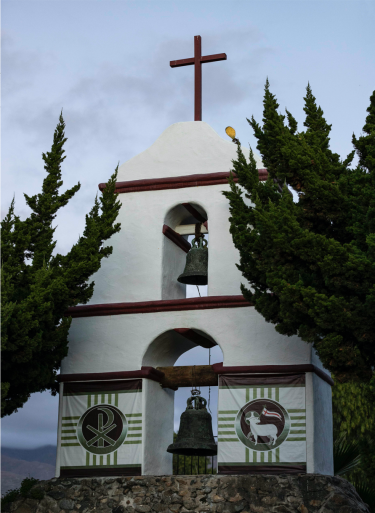
Bernard Gordillo Brockman (Yale University, Institute of Sacred Music)
Monday, March 14, 1:00
Imig S102 Chamber Hall
To learn more about this event, or to attend virtually click here.
Recent Events
Yoga as White Public Space
A Public Lecture by Dr. Rumya Putcha (University of Georgia)
Wednesday, March 2, 5:00 p.m.
Imig Music Building, S102
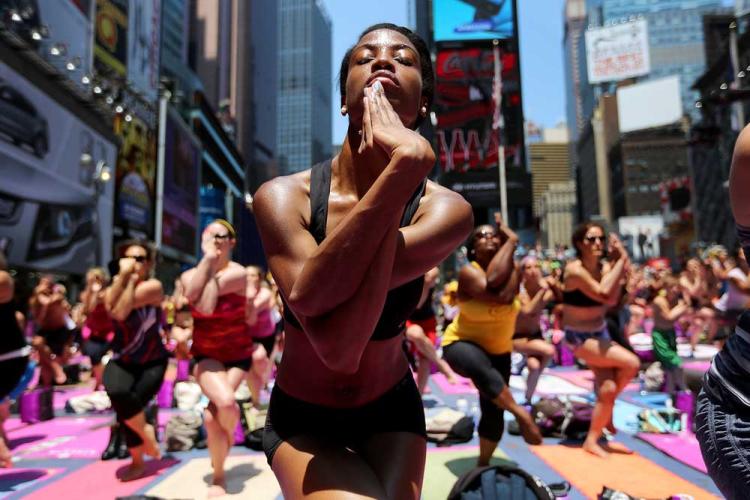
To learn more about this event and Dr. Rumya S. Putcha, as well as to register to attend virtually, click here.
PLAYED: How Music and YouTube Exploit Twerking and Orchestrate Violence Against Black Girls Online
2022 Counterpoints Lecture by Kyra Gaunt, University at Albany, SUNY
Tuesday, February 22, 5:00 pm
This is a virtual event. To register for the Zoom link, click here.
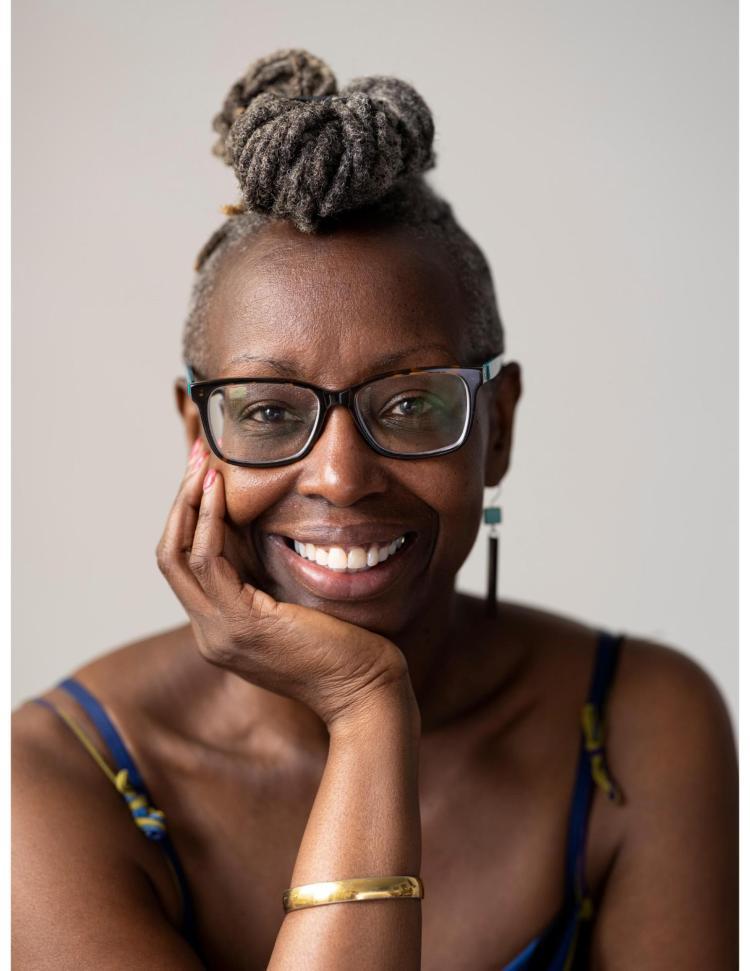
While TikTok, with one billion users across 154 countries, became the most downloaded app during the global COVID-19 pandemic, YouTube held steady as the number one destination for music search and discovery. Both platforms were fined millions by the FTC in 2019 for accusations of violating the Children's Online Privacy and Protection Act. When users search for hits that girls' hips make famous from YouTube to TikTok, the sheer volume of ubiquitous music listening masks online child sexploitation orchestrated by music tech. 14-year-old Jalaiah Harmon's choreography drove attention to K-CAMP's hit, "Loyalty (Renegade)," but Black girls get no love and little profit for their taste-making on the musical Internet.
This keynote is based on writing from Gaunt's forthcoming book, PLAYED: How Music Orchestrates Violence Against Black Girls Online. Using case studies from YouTube, the adverse consequences of tween twerking in bedroom musical play are exposed.
To learn more about this event and Dr. Kyra Gaunt as well as to register to attend virtually, click here.
"The Ways of White Folks:" Fletcher Henderson's Sonic Theorization of Whiteness in "Whiteman Stomp"
A Public Lecture by Dr. Stephanie Doktor, Colorado College
Monday, February 7, 2022, 1:00 pm
Imig Music Building S102
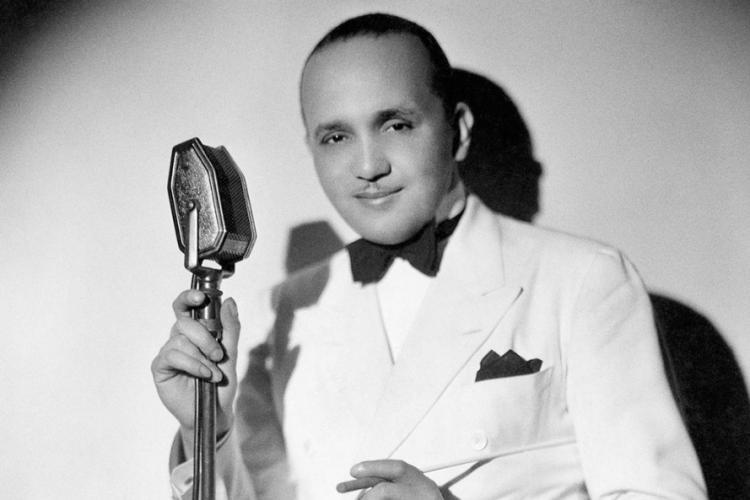
For centuries, Black writers such as Harriet Jacobs, W.E.B. Du Bois, and James Baldwin, among many, many others, have provided unparalleled insight into the innerworkings of white supremacy. However, other mediums beyond the written word capture such expertise. In this presentation, Stephanie Doktor considers how critical engagement with whiteness can be heard in the music of Black jazz musicians. In 1927, Fletcher Henderson recorded “Whiteman Stomp,” parodying the musical style of the “King of Jazz.” If U.S. entertainment had historically been based on the white gaze, white imaginations of Blackness, and the subjugation of Black performers to this orientation, then Henderson’s recording turns the industry on its head. It refracts this gaze, staring back at whiteness. In her analysis of this arrangement and Whiteman’s response to it, Doktor argues that Henderson, in his sonic theorization of Black music, makes whiteness legible. His recording challenges the myth that this racial category is invisible—a myth that coheres its social power—and opens up the possibility of scrutinizing white supremacy by making it audible. This presentation is part of the 2021-2022 Musicology and Music Theory Colloquium Series.
Dr. Stephanie Doktor is a Visiting Assistant Professor of Musicology at Colorado College. Her research and teaching examine how systematic forms of power contour U.S. music. Recent journal articles in American Music and the Journal of the Society for American Music ask scholars to consider the racial biases of contemporary historical methods. Her book, Reinventing Whiteness: Race in the Early Jazz Marketplace (under contract with University of California Press) evaluates the role of white supremacy in the formation and ensuing popularity of jazz in the 1920s
Lleva Nuestras Voces
Saturday, Nov. 6, 2021, 7 p.m.
Dairy Arts Center, Gordon Gamm Theatre
2590 Walnut St., Boulder, CO 80302
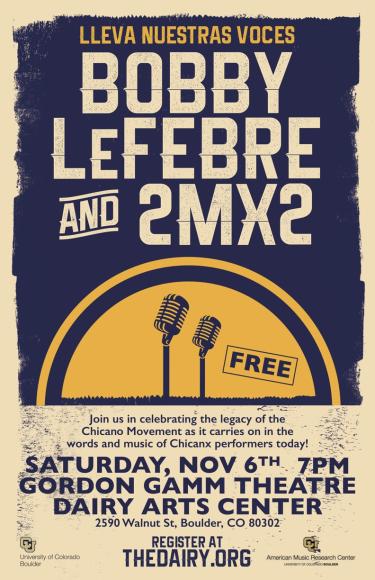
Free + open to the public
Join us in celebrating the legacy of the Chicano Movement as it carries on in the words and music of Chicanx performers today. Colorado Poet Laureate Bobby LeFebre will present a virtual reading of his work, followed by a live, in-person performance by pop/hiphop group 2MX2 in this free closing event for the “Los Seis de Boulder, Race and Memory” Symposium at CU Boulder.
Bobby LeFebre is the youngest and first-ever person of color to be Colorado Poet Laureate. Appointed to that position by Governor Jared Polis in 2019, LeFebre is an award-winning writer, performer, and cultural worker. He fuses a non-traditional, multi-hyphenated professional identity to imagine new realities, empower communities, advance arts and culture, and serve as an agent of provocation, transformation, equity and social change. His work has appeared in The New York Times, HuffPost, The Guardian, American Theater Magazine, NPR and Poets.org.
Denver-based Latino pop/hiphop group 2MX2’s blood runs thick with the traditions embedded in their respective heritages, turned to face the present day. Rappers Juice El Tio Hugo and O1, singer Lolita, and producer DMD, along with Kid Astronaut on keys and Kenny Ortiz (Flobots) on drums, thrive in creating content that focuses on identity and fostering community and an honest platform for their fans to connect. They maintain a deep commitment to pushing diversity within the arts through outreach to local youth groups and with school programs.
This event is presented by CU Boulder’s American Music Research Center and University Libraries, with support also provided by the CU President’s Fund for the Humanities.
Borders/Boundaries/Fronteras: Rethinking American Music
Friday, October 15, 2021, noon—5 p.m. (MST)
Koelbel Building on CU campus, Room C342
(in the Leeds School of Business)
Or by Zoom: Meeting ID: 951 0472 6125
https://cuboulder.zoom.us/j/95104726125

Free and open to the public
As we enter the third decade of the 21st century, borders loom large, inserting or reinserting themselves in our aesthetic, cultural, and political lives. From the use of walls and fences to define physical and political boundaries; to the music industry’s attempted policing of genre crossers, like Lil Nas X and his 2019 summer mega-hit “Old Town Road;” to the striking blurring of historical boundaries as protestors in Santiago, Chile in 2019 sang Victor Jara’s “El derecho de vivir en paz,” sonically slamming past and present together; borders—far from becoming obsolete—have achieved a new poignancy. Featuring leading scholars of music of the United States, Latin America, and the Caribbean whose work appears in the inaugural issue of the journal, Americas: A Hemispheric Music Journal, this Symposium explores the ways that borders—whether geographic, political, social, sonic, performative, or temporal—impact music, musical making, musical reception, and musical meaning.
“A community without a band, is a community without a soul”
Monday, October 11, 2021, 2-3 p.m. (MST)
Imig Music Building, Chamber Hall, Room S102
(refreshments following in Room S101)
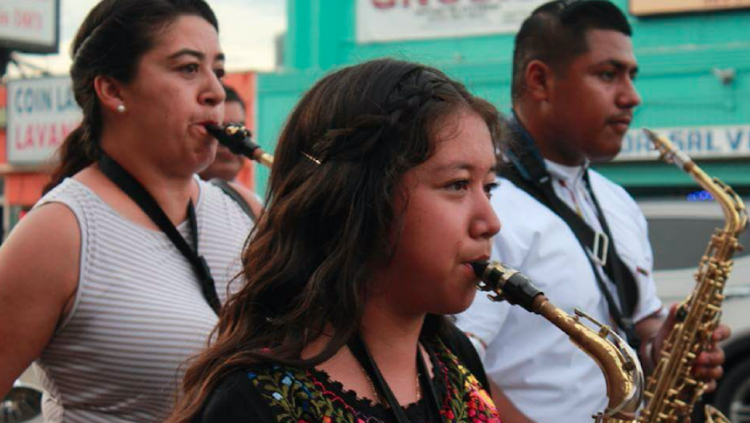
Free and open to the public
As gentrification in California spreads across many working-class neighborhoods deemed by real estate as “up and coming” areas, this discussion highlights the social and cultural realities of migrant community-based brass bands from Oaxaca, Mexico. The presence of second generation Bandas Oaxaqueñas in Los Angeles, California exemplifies the diversity of Oaxaca’s ethnolinguistic communities and how musicians strive to maintain their ethnic identity and linguistic plurality within a bustling urban space.
This paper draws attention to two intergenerational Sierra Juarez Zapotec philharmonic brass bands, their systems of learning music, strategies for substitutability in a transnational context and adaptability during the COVID-19 pandemic. In order to avoid unwanted attention and criminalization, forms of vernacular placemaking are vital in establishing safe spaces for mixed legal status musicians, such as privately-owned home garages and rented warehouses. Within these spaces, musicians create translingual forms of pedagogy between Zapotec, Spanish, and English. To maintain cultural flows of musical repertoires – indigenous composers on both sides of the U.S. and Mexico border circulate traditional and contemporary music pieces as a way to articulate their continued existence despite localized and national challenges.
Dr. Xóchitl C. Chávez is the first tenure track Chicanx assistant professor in the Department of Music at the University of California, Riverside. She is a scholar of expressive culture and performance, specializing in Indigenous communities from southern Mexico and transnational migration. Her current work focuses on second-generation Zapotec brass bands in Los Angeles, California, and transborder relationships with their communities of origin in Oaxaca, Mexico. Dr. Chávez's forthcoming book manuscript with Oxford University Press titled The Guelaguetza: Performative Crossroads, Ethnicity, and Greater Oaxaca documents the lived and performative movements of how Oaxacan communities in Los Angeles and Santa Cruz, California reproduce the annual La Guelaguetza festival, one of the most prominant indigenous celebrations of communal dances and musical forms.



